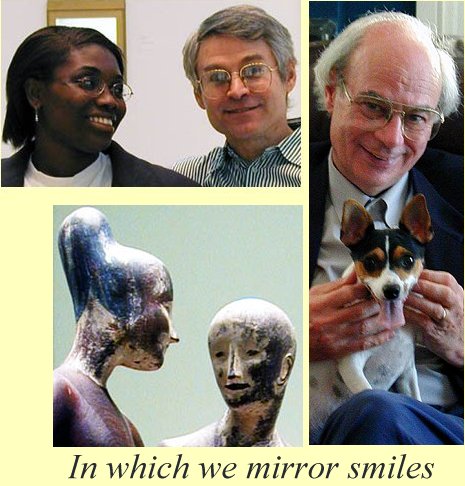Psychological Synchronicity
John H. Lienhard presents guest essayist Megan Cole
Today, actor Megan Cole talks about faces and feelings. The University of Houston presents this series about the machines that make our civilization run, and the people whose ingenuity created them.
Researchers at UCLA recently made a study, reported in Health Magazine, in which they showed participants photos of other people's faces and asked the subjects to mimic those faces. When they did, the emotional centers of their brains fired up, something that didn't happen when they kept straight faces.
The process we're talking about here is something called "Physiological Synchronicity." It's a fancy phrase that refers to the ways in which the body and the mind interact. It has to do with how the sympathetic and parasympathetic branches of the nervous system "talk" to each other. Physical reactions can give us insights into emotional states, both in other people and in ourselves.
Look at facial mimicry, for example. We've all had this experience: We're talking to a friend who is sad and begins to cry. And we notice that our facial muscles automatically start to mirror our friend's expressions. And then -- this is the amazing part -- we start to feel the same emotions our friend is feeling. By adopting others' facial positions, we can come more closely to appreciate their internal condition. It's a kind of physiological empathy.
Edgar Allen Poe knew this long ago, when he wrote:
When I wish to find out how wise or how stupid or how good or how wicked is anyone, or what are his thoughts at the moment, I fashion the expression of my face, as accurately as possible, in accordance with the expression of his, and then wait to see what thoughts or sentiments arise in my mind or heart.
Well, Poe was writing about the mind-body connection, and his advice is a powerful tool for becoming more empathically attuned to the experiences of others. Try it. I think you'll find it works.
But the reverse is also true. Other people, consciously or unconsciously, mirror our expressions and are influenced by them. Knowing this is especially important for people who work in public positions, like doctors or actors or -- dare I say -- politicians. For when we realize that our facial and physical behavior can trigger intense emotional responses in others, we can then ask ourselves, "What are they seeing? Is this the message I mean to send?"
And we can influence the messages we send to ourselves as well. Smiling in general will calm the central nervous system, frowning will tend to make us feel more negative. Our moods are altered by our bodies' physiological responses. Just try to say "I love you" -- and mean it -- with a frown. See what I mean?
So this "physiological synchronicity" is more than a fine-sounding phrase. It's scientific self-care. It's also care of others, who will, when smiled to, as if by magic, smile back.
This is Megan Cole, and in the theatre, as at the University of Houston, we give a great deal of attention to the way inventive minds work.
A. Ciaramicoli, and K. Ketcham, The Power of Empathy. New York, NY: Dutton, 2000.
Megan Cole is a noted stage and TV actor and regular visiting faculty member at the University of Texas Medical Center in Houston. She origi-nated the role of Dr. Vivian Bearing in the Pulitzer-Prize-winning play Wit. She has also played recurring characters on Seinfeld, ER, Star Trek, Judging Amy, and other popular shows.
For more on this topic, see Episode 883. Photos by John and Carol Lienhard
